
Francis Albert Sinatra was an American singer and actor. Nicknamed the "Chairman of the Board" and later called "Ol' Blue Eyes," he is regarded as one of the most popular entertainers of the mid-20th century. Sinatra is among the world's best-selling music artists, with an estimated 150 million record sales globally.
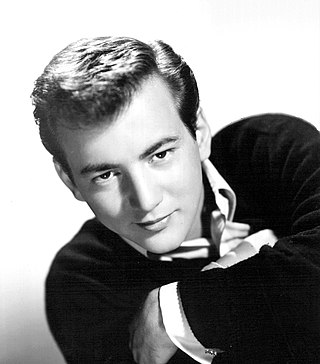
Bobby Darin was an American musician, songwriter, and actor. He performed jazz, pop, rock and roll, folk, swing, and country music.

Anthony Dominick Benedetto, known professionally as Tony Bennett, was an American jazz and traditional pop singer. He received many accolades, including 20 Grammy Awards, a Lifetime Achievement Award, and two Primetime Emmy Awards. Bennett was named a National Endowments for the Arts Jazz Master and a Kennedy Center Honoree. He founded the Frank Sinatra School of the Arts in Astoria, Queens, New York along with Exploring the Arts a non-profit arts education program. He sold more than 50 million records worldwide and earned a star on the Hollywood Walk of Fame.

Barry McGuire is an American singer-songwriter primarily known for his 1965 hit "Eve of Destruction". He was later a singer and songwriter of contemporary Christian music.
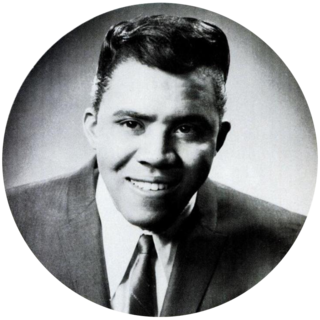
Jimmy Lee Ruffin was an American soul singer, and the older brother of David Ruffin, the lead singer of the Temptations. He had several hit records between the 1960s and 1980s, the most successful being the Top 10 hits "What Becomes of the Brokenhearted" and "Hold On ".
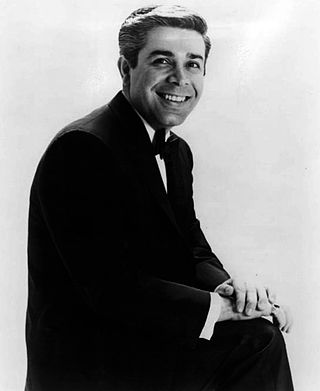
Jerry Vale was an American traditional pop singer. During the 1950s and 1960s, he reached the top of the pop charts with his interpretations of romantic ballads, including a cover of Eddy Arnold hit "You Don't Know Me" (1956) and "Have You Looked into Your Heart" (1964). Vale, who was of Italian descent, sang numerous songs in Italian, many of which were used in soundtracks by films of Martin Scorsese.

Jasper Cini, known professionally as Al Martino, was an American traditional pop and jazz singer. He had his greatest success as a singer between the early 1950s and mid-1970s, being described as "one of the great Italian American pop crooners", and became known as an actor, particularly for his role as singer Johnny Fontane in The Godfather.

Louis Allen Rawls was an American baritone singer. He released 61 albums, sold more than 40 million records, and had numerous charting singles, most notably the song "You'll Never Find Another Love like Mine". He also worked as a film, television, and voice actor. He was a three-time winner of the Best Male R&B Vocal Performance Grammy Award.

Lou Monte was an Italian American singer best known for a number of best-selling, Italian-themed novelty records which he recorded for both RCA Victor and Reprise Records in the late 1950s and early 1960s, most famously "Lazy Mary" (1958) and the 1962/63 million-selling US single "Pepino the Italian Mouse", plus the seasonal track "Dominick the Donkey". He also recorded on Roulette Records, Jubilee Records, Regalia Records, Musicor Records, Laurie Records, and AFE Records.
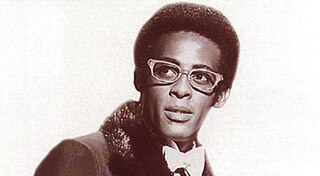
David Ruffin was an American soul singer most famous for his work as one of the lead singers of the Temptations (1964–1968) during the group's "Classic Five" period as it was later known. Ruffin was the lead voice on such famous songs as "My Girl" and "Ain't Too Proud to Beg." He later scored two top-ten singles as a solo artist, "My Whole World Ended " and "Walk Away from Love."

"MacArthur Park" is a song written by American singer-songwriter Jimmy Webb that was recorded first in 1967 by Irish actor and singer Richard Harris. Harris's version peaked at number two on the Billboard Hot 100 chart and number four on the UK Singles Chart. "MacArthur Park" was subsequently covered by numerous artists, including a 1970 Grammy-winning version by country singer Waylon Jennings and a number one Billboard Hot 100 disco version by Donna Summer in 1978. Webb won the 1969 Grammy Award for Best Arrangement Accompanying Vocalist(s) for the Harris version.

"Que Sera, Sera " is a song written by the team of Jay Livingston and Ray Evans that was first published in 1955. Doris Day introduced it in the Alfred Hitchcock film The Man Who Knew Too Much (1956), singing it as a cue to their onscreen kidnapped son. The three verses of the song progress through the life of the narrator—from childhood, through young adulthood and falling in love, to parenthood—and each asks "What will I be?" or "What lies ahead?" The chorus repeats the answer: "What will be, will be."
"Just Say I Love Her" is a popular song, adapted from the Neapolitan song "Dicitencello vuje". The original music was written by Neapolitan composer Rodolfo Falvo in 1930; and was arranged in the United States by Jack Val and Jimmy Dale; the original Neapolitan lyrics by Enzo Fusco, and English lyrics by Martin Kalmanoff and Sam Ward.

"A Place in the Sun" is a 1966 soul single by American and Motown musician Stevie Wonder. Written by Ronald Miller and Bryan Wells, it was one of Wonder's first songs to contain social commentary. "A Place in the Sun" was his third Top Ten hit since 1963, hitting number 9 on the Billboard pop singles chart and number 3 on the R&B charts. Billboard described the song as a "folk-oriented release" to which Wonder gives an "exciting treatment." The Originals and The Andantes sang background vocals on the recording. Stevie Wonder also recorded a version of the song in Italian titled "Il Sole è di Tutti".
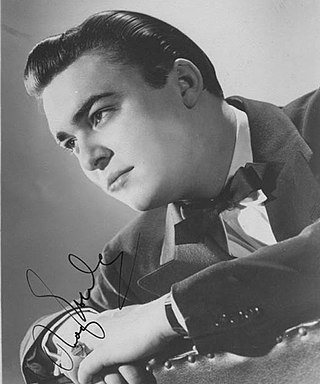
Raymond Eberle was a vocalist during the Big Band Era, making his name with the Glenn Miller Orchestra. His elder brother, Bob Eberly, sang with the Jimmy Dorsey Orchestra.
"It's Been a Long, Long Time" is a big band-era song that was a hit at the end of World War II, with music by Jule Styne and lyrics by Sammy Cahn.
Los Kumbia All Starz are an American musical group from Corpus Christi, Texas, created by A.B. Quintanilla. Kumbia All Starz are not to be confused with Los Kumbia Kings although some members are originally from Los Kumbia Kings. Their 2006 debut album Ayer Fue Kumbia Kings, Hoy Es Kumbia All Starz reached number one on United States Billboard's Latin Pop Albums chart, number one on the Top Latin Albums chart, and number sixty-eight on the United States Billboard 200. The album spawned two charting singles, "Chiquilla" and "Parece Que Va a Llover" single sung by Ricky Rick.
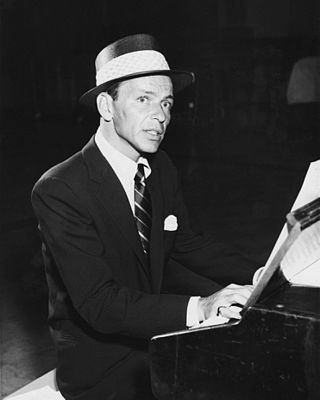
Frank Sinatra's musical career began in the swing era in 1935, and ended in 1995, although he did briefly retire in 1971, before returning to music in 1973. Sinatra is one of the most influential music artists of the 20th century, and has sold 150 million records worldwide, making him one of the best-selling music artists of all-time. Rock critic Robert Christgau called Sinatra "the greatest singer of the 20th century". In addition to his music career, Sinatra was also a successful film actor, having won the Academy Award for Best Supporting Actor for his role as Private Angelo Maggio in From Here to Eternity (1953).

"We'll Sing in the Sunshine" is a 1964 hit song written and recorded by Gale Garnett which reached No. 2 in Canada, and No. 4 on the U.S. Billboard Hot 100 chart for the week ending 17 October 1964. It also enjoyed success on easy listening and country music radio stations, spending seven weeks at No. 1 on the Billboard Easy Listening chart and No. 42 on the country chart. The Cash Box Top 100 ranked "We'll Sing in the Sunshine" at No. 1 for the week of 31 October 1964, and it also reached No. 1 in Garnett's native New Zealand that November. In Australia, "We'll Sing in the Sunshine" afforded Garnett a Top Ten hit with a No. 10 peak in October 1964. Garnett's sole Top 40 hit, "We'll Sing in the Sunshine" won the Grammy Award for Best Ethnic or Traditional Folk Recording in 1965.

James Radcliffe was an American soul singer, composer, arranger, conductor and record producer.

















